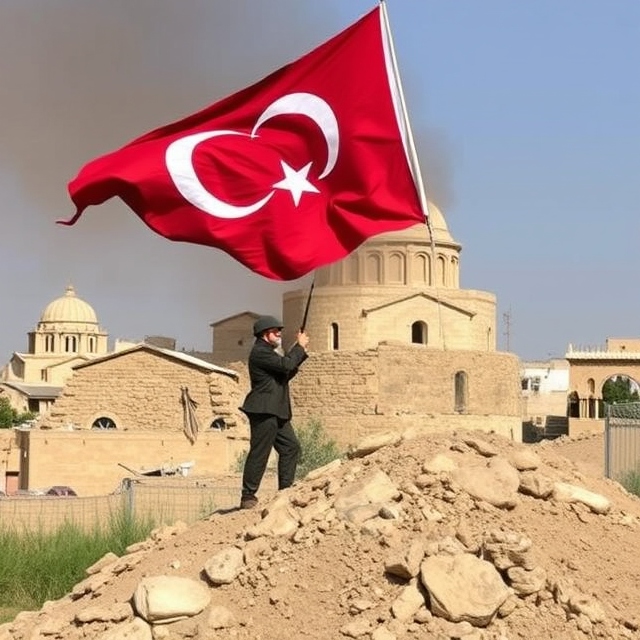
Turkey’s Role and Gamble: Turkey’s backing of HTS, a rebranded al-Qaeda affiliate, highlights its expansionist ambitions in Syria, leveraging non-state actors for regional control, despite significant geopolitical risks.
Geopolitical Impact: The fall of Assad’s regime weakens Russia and Iran’s influence in Syria, disrupting the “Axis of Resistance” and diminishing Russia’s strategic foothold in the Middle East and Africa.
Double Standards in Terrorism: The selective approach of states like Turkey and the U.S. toward terrorism raises ethical concerns, as they prioritize geopolitical gains over consistent counter-terrorism principles.
Syria is witnessing a significant political shift as the civil war, which began in 2011 in the Daraa province, has finally reached an unprecedented conclusion. The war, which aimed to topple the longstanding rule of President Bashar al-Assad, has now ended. At the center of the recent developments is the HTS (Hay’at Tahrir al-Sham) terrorist group, which is backed by Turkey and has played a critical role in challenging the Syrian president’s authority.

It is important to understand that HTS (Hay’at Tahrir al-Sham) has been an affiliated body of al-Qaeda operating in Syria since 2013. HTS is essentially a rebranded version of al-Qaeda itself, as from 2013 to 2017, it operated under the name Jabhat al-Nusra. This group had its stronghold in Idlib, and in 2017, it was rebranded as HTS. Therefore, HTS is not a new front in the civil war but rather the same violent terrorist organization seeking power in Syria. This is by no means a war of liberation or a cause for celebration. On the contrary, it marks a serious regression, with a terrorist group reemerging under a new name to assert dominance. The rebranding of such groups is one of the worst developments for Syria and its territorial integrity.
Turkey’s Role in the Syrian Saga
What is particularly interesting to note is Turkey’s role in sponsoring HTS (Hay’at Tahrir al-Sham). This highlights that the backing of HTS is nothing less than state-sponsored terrorism by Turkey inside Syria. Turkey’s indirect involvement in Syria is part of its broader strategy. Turkey has maintained a legitimate presence in northern Syria, citing security concerns, and this has always been a contentious issue in Turkish-Syrian relations.

Source: Carnegie Endowment for International Peace
For years, Russia has attempted to mediate between Turkey and Syria, but talks have stalled. Syrian President Bashar al-Assad has consistently maintained that discussions with Turkey can only proceed if Turkey withdraws its forces from Syrian territory. Turkey’s presence in northern Syria is primarily driven by its opposition to the Kurdish YPG/PKK groups, which Turkey views as terrorist organizations. These groups are not only active in northern Syria but also have connections to Kurdish regions within Turkey, which demand autonomy.
Turkey’s invasion of northern Syria was justified by Ankara as a way to counter the YPG/PKK threat. However, Assad has accused Turkey of using Syrian territory to back such groups, further straining relations between the two countries. The backing of HTS is seen as a strategic move by Turkey to maintain control over northern Syria while using the Kurdish militias as a pretext.
This reveals Turkey’s expansionist ambitions under President Erdoğan, portraying the country as opportunistic and willing to assert dominance over Syrian territory. This policy not only disrupts the region’s stability but also reinforces Turkey’s image as an expansionist power under Erdoğan’s leadership.
Security concerns against one’s own country are legitimate, but resorting to non-state actors to address these concerns only undermines their validity and purpose. While Turkey’s concerns may seem rational, its decision to support HTS (Hay’at Tahrir al-Sham)—a known terrorist organization—as a solution is deeply flawed.
It is crucial to understand that HTS itself will exacerbate terrorism, systematically targeting minorities such as Alawites, Shias, Christians, Druze, and Kurds. HTS, as a rebranded form of al-Qaeda, remains one of the most dangerous terrorist organizations. Its resurgence is not a victory for President Erdoğan but rather a significant loss for both the region and Syria as a nation.
This issue raises fundamental questions about the duplicity of states in their approach to terrorism. Countries like Turkey and the United States often label groups as terrorists only when those groups pose a direct threat to them, while ignoring or even supporting other groups that align with their strategic interests. This double standard is evident, especially in the case of HTS.
While the U.S. is reportedly reconsidering its designation of HTS as a terrorist organization, leaders must recognize that addressing one form of terrorism with another is not a sustainable or ethical solution. The fight against terrorism requires consistent principles, not selective definitions based on convenience or geopolitical gain.
Russia & Iran’s Interest in Syria
At present, Syria is experiencing a political void. The new opposition government, likely to form under the leadership of HTS and the Syrian National Army, is composed of groups that have engaged in terrorism throughout their existence. While the future of Syria should undoubtedly be decided by the Syrian people, critical questions arise regarding Iran’s role in the region.
Syria holds immense strategic importance for Iran, as it serves as a gateway to logistically support the “Axis of Resistance,” including groups like Hamas and Hezbollah. This support was only possible due to the presence of President Assad. Now that Syria has fallen, it will become significantly more challenging for Iran to maintain its influence and support its allies. This marks a geopolitical loss for Iran and a setback for the Axis of Resistance. How Iran will respond to this challenge remains to be seen.
Another crucial question concerns Russia’s presence in Syria. Russia intervened to assist Syria in its fight against Western-backed terrorist groups, recognizing the strategic threat they posed. Russia has maintained military bases in Latakia and Tartus for years, which are vital for its military operations. These bases not only supported Russia’s operations in Syria but also served as logistical hubs for military activities in Africa, including refueling fighter aircraft.
The loss of Assad’s government represents a significant geopolitical loss for Russia. It weakens Russia’s strategic foothold in the Middle East and undermines its ability to project power into Africa. In recent days, Russia has reportedly mobilized its military presence in the region, highlighting its intent to protect its interests. However, the fall of Assad’s regime signals a broader decline in Russia’s influence in Syria and potentially in Africa as well.
As things stand, the current situation appears to favor Turkey and, to some extent, the United States of America. For the U.S., this development is a victory as it removes a Syrian president aligned with Iranian interests. However, it is crucial to consider how this will impact the region in the long term.
Iran is unlikely to accept Turkey’s growing influence in Syria, and Russia will also question Turkey’s actions, as they threaten both Russian and Iranian interests in the region. This may lead Iran to intensify its support for certain groups in Syria, potentially targeting Turkey’s presence more directly.
President Erdoğan has taken a significant gamble in Syria, and while it may seem advantageous now, it has raised numerous geopolitical challenges for Turkey. Both Iran and Russia may push back against Turkey’s expanded influence, creating new tensions. This move has increased Turkey’s geopolitical entanglements and exposed it to more complex regional problems.
Reference:
Aayush Pal is a freelance writer on contemporary geopolitical developments. The views expressed in his work are entirely his own.
